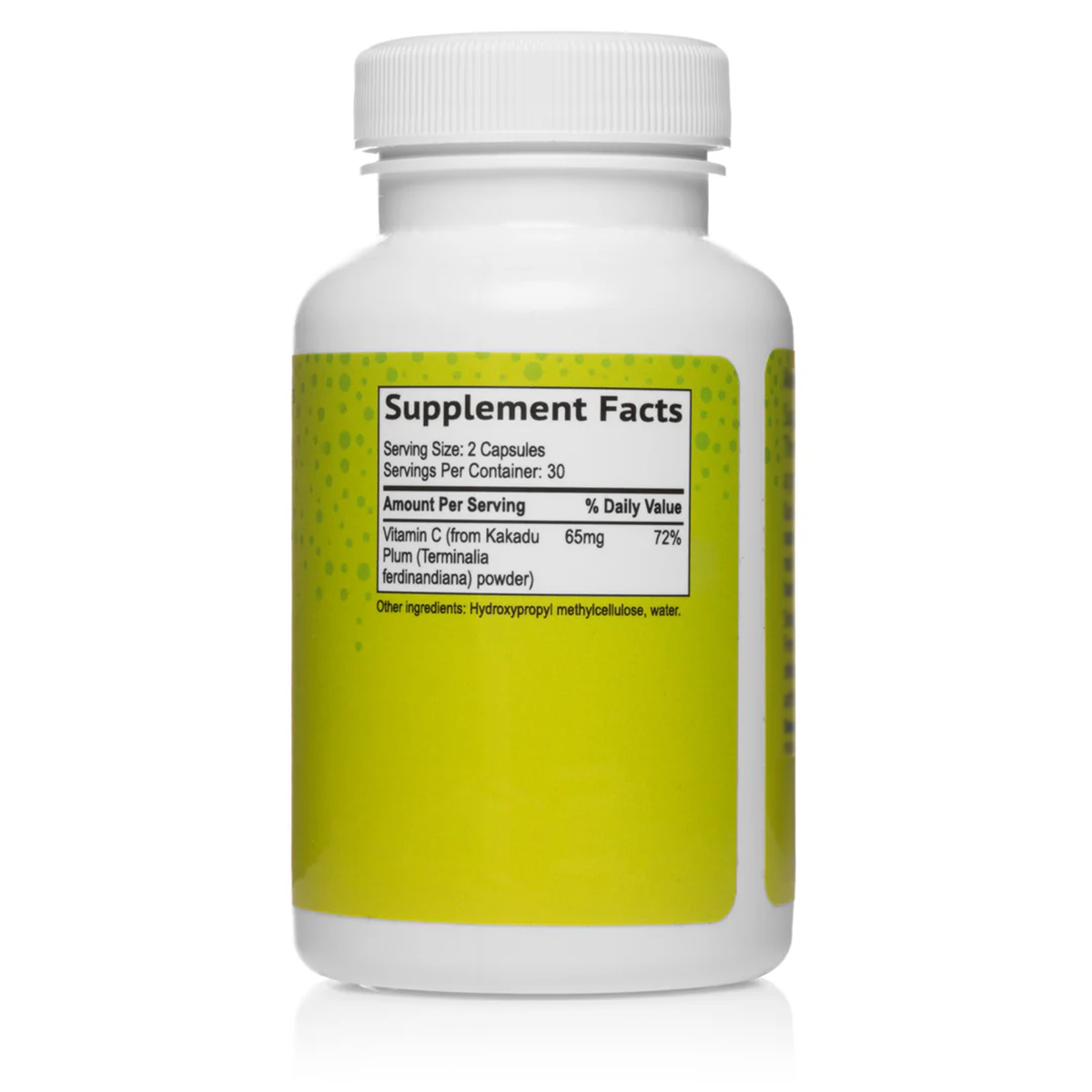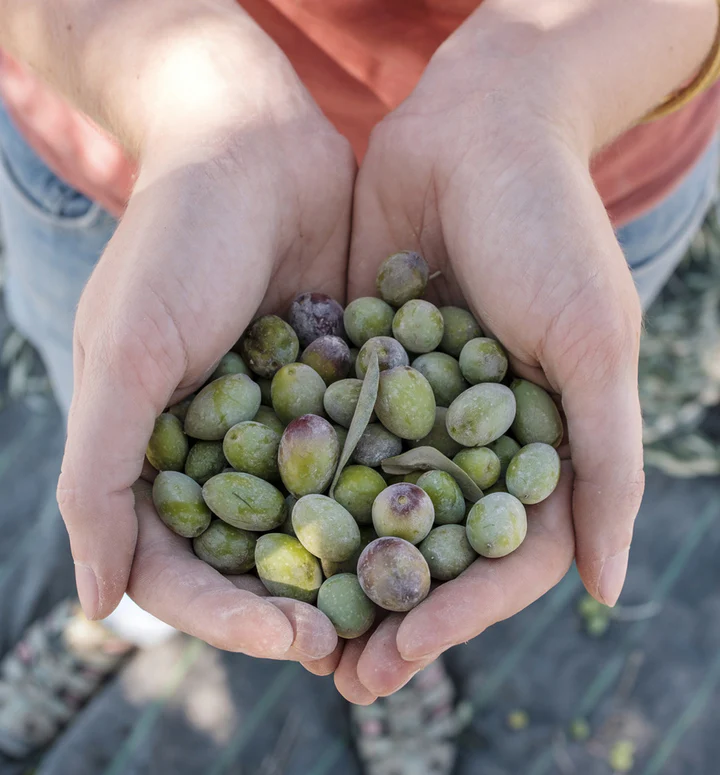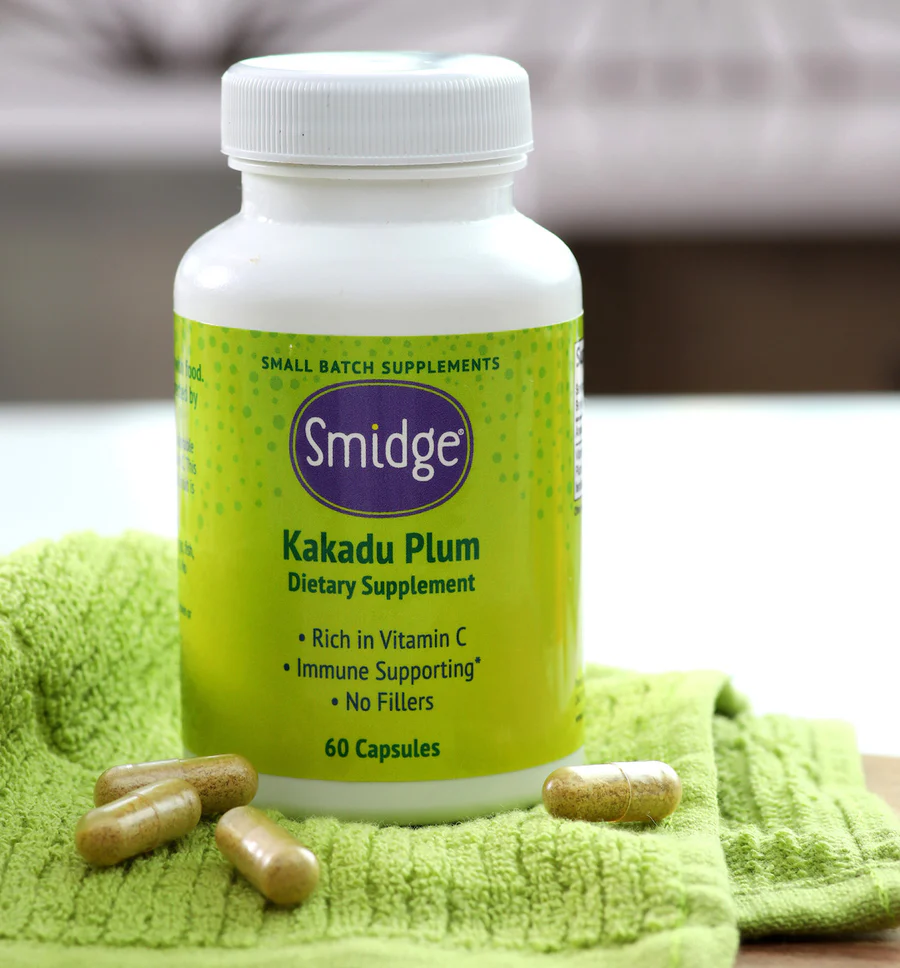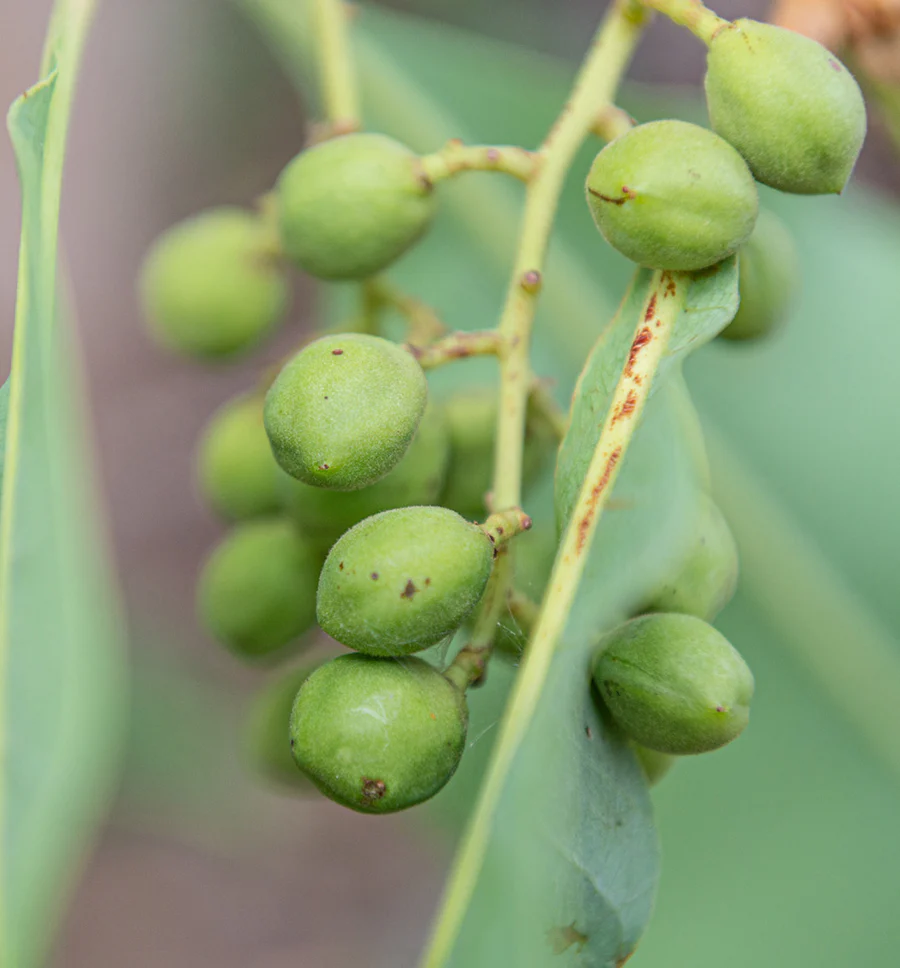Kakadu Plum
Kakadu Plum
60-Day Guarantee
FREE US Shipping
Free Gifts

BUNDLE & SAVE
Couldn't load pickup availability

Get it between - and -.





Pure & crafted to retain as much vitamin C as possible
Like all supplements, our Kakadu Plum is as pure as can be. It's made entirely from the fresh puree of the fruit, which is dehydrated with a gentle drying technique called refractance window drying — a unique method that uses infrared light, rather than high heat, to remove water from food. This method is unmatched in preserving the fruit's natural vitamin C. It also enables your body to absorb and use the vitamin C, rather than excreting large amounts shortly after consuming the harsh, synthetic stuff (leaving you with inflammation in the gut or urinary tract).

No common allergens, fillers — or ascorbic acid
Free of common allergens, additives and fillers, our Kakadu Plum capsules are easy on those with sensitive digestive systems and fit right in with many dietary protocols.
You also won't find added ascorbic acid, the synthetic form of vitamin C in most commercial supplements (even “food-based)”, that can cause nutrient imbalances and negative side effects.*
Here's the rub with ascorbic acid… Most "food-based" vitamin C supplements are fortified with ascorbic acid, even though it's not listed on the label. For example, you can purchase raw material, such as acerola powder, that’s "standardized" to a certain vitamin C percentage. During production, heat destroys some (or most) of the vitamin C in the acerola powder and ascorbic acid is added to standardize the vitamin C levels. A supplement company may unwittingly buy "all-natural acerola powder" and not realize (or disclose) that up to 100% of the vitamin C is actually fortified ascorbic acid.*
How vitamin C nurtures the body
Kakadu Plum is a real food vitamin C supplement, bursting with the highest natural amounts of vitamin C you can get. Our customers take it to support immunity, fulfill their daily requirements (✓!), and soak up all of the other sunny, happy vitamin C benefits.
Your body depends on vitamin C to help form and maintain bones, skin and blood vessels, build up the immune system and protect cells from free radicals.* Since your body cannot supply its own, vitamin C is a must for your healthy diet. Check out these well-documented benefits of vitamin C and the Kakadu plum:


More precious, naturally-occurring nutrients
Kakadu plum contains phytonutrients like ellagic acid, which has antioxidant and antimicrobial capacities, to support cells.* They also contain many antioxidants, including quercetin, flavonols, aromatic acids, anthocyanin and lutein. Antioxidants may protect against the effects of free radicals.* To put the amount into perspective, Kakadu plum contains six times the number of polyphenols and almost 13 times more antioxidant activity than blueberries!*
Plus, Kakadu plum has copper and iron, which are used to form red blood cells, bones, connective tissue, enzymes, as well as support fetal development and the immune system.* These minerals help transport oxygen throughout the body and red blood cell production.*
Other nutrients in Kakadu plum include flavonols, aromatic acids, anthocyanins and lutein.

Sustainability
We work hand-in-hand with an Australian partner to supply Smidge® Kakadu Plum to you and your families. In this regard, supporting and honoring local communities and groups is imperative. This includes the indigenous Aboriginal communities of the Larrakia and Djerimanga through our operations, with whom we’re honored to work with during harvesting and production.
We respect the traditional owners of the lands where we harvest the Kakadu plums. And, we promote responsible and sustainable operations so that native Australian flora and fauna can exist for generations to come.
Further, we only pick approved fruit to ensure the native plants have room to grow each season. We also ensure that any harvest by-products are used to support the area’s wildlife.
How to use it?
Common Questions
Collapsible content
Is Kakadu Plum organic?
Is Kakadu Plum organic?
Yes, it is organic! Because it is harvested and grown in Australia, our Kakadu does not have the USDA organic certification. Rather, Kakadu Plum is Australian Certified Organic, a designation given by an independent body in Australia.
Are Kakadu Plum capsules fortified (standardized) with ascorbic acid?
Are Kakadu Plum capsules fortified (standardized) with ascorbic acid?
Absolutely not. Ascorbic acid is the synthetic version of vitamin C. Kakadu Plum capsules contain only the naturally occurring vitamin C in the fruit, and nothing else.
Producers of powdered fruits high in vitamin C often use various production methods that can result in vitamin C degradation. Then, they add ascorbic acid to the final product.*
At Jimend, we chose to provide a real food vitamin C supplement that avoids ascorbic acid at all costs. This is because ascorbic acid is usually derived from GMO corn and can cause health issues, such as blocking the absorption of enzymes and nutrients and toxic build-up.
What’s the difference between real vitamin C and ascorbic acid?
What’s the difference between real vitamin C and ascorbic acid?
Most sources equate vitamin C with ascorbic acid, as though they were the same thing. They're not. Here's how to understand the difference:
Ascorbic acid is an isolate, a fraction, a distillate of naturally occurring vitamin C.
In addition to ascorbic acid, vitamin C must include rutin, bioflavonoids, K-factor, J-factor, P-factor, tyrosinase, ascorbinogen and other components. Plus, mineral co-factors must be available in proper amounts.
If any of these parts are missing, there is no vitamin C and no vitamin activity. In all, you need the whole food to receive the full vitamin, and thus, all the benefits it yields.
How do other real foods stack up to the vitamin C in Kakadu Plum?
How do other real foods stack up to the vitamin C in Kakadu Plum?
The vitamin C in Kakadu Plum supplement beats all the rest.
On average, the Kakadu Plum has:
- Over 100 times the amount of vitamin C than oranges.
- And over five times the amount of antioxidants than blueberries.
It's the highest source of naturally occurring vitamin C from any food in the world! One serving of two little capsules contains nearly 75% your daily value of vitamin C. But please note that the vitamin C levels will vary, since this is a fresh, natural supplement made from real food!
Isn't it enough to get my vitamin C from everyday foods?
Isn't it enough to get my vitamin C from everyday foods?
Adults can reach their recommended daily allowance by eating fruits and vegetables rich in vitamin C. For example, half a cup of steamed broccoli and half a cup of freshly sliced strawberries equals 100 mg of vitamin C. But many health-conscious folks desire more, whether on dietary protocols, working to support immunity or not getting enough through diet.
Is there a limit to the vitamin C I should take?
Is there a limit to the vitamin C I should take?
The right amount for you depends on your specific health goals; your healthcare provider can help you determine the proper dosage. Vitamin C is water-soluble, meaning it is carried to your body's tissues but not absorbed, as it dissolves in water. So your body does not store any excess.
Tell me more about the Kakadu plum. I've never heard of it before.
Tell me more about the Kakadu plum. I've never heard of it before.
Kakadu plum (Terminalia ferdinandiana) is a small, wild-growing deciduous tree found extensively throughout the subtropical woodlands of northern and western Australia. It has broad leaves and bears an abundant crop of small plum-like fruits with the highest amount of vitamin C in any food in the world! The trees typically bear fruit annually in May, the start of the dry season.
This dynamic fruit is about the size of a cherry. The Kakadu plum has thick skin and a small nut in its center. It's tart-tasting, not sweet like the purple plums we sink our teeth into here in the U.S.
For thousands of years, the indigenous Aboriginal peoples of Australia have used the Kakadu plum.* The sap and bark were used to treat skin conditions and make tea for common colds.* Now, Smidge® brings this little-known, ancient superfood home to you.
Can you tell me more about refractance window drying?
Can you tell me more about refractance window drying?
It is a unique, self-limiting dehydration method that uses infrared light, rather than direct temperature extremes, to remove water from food.
Relying on water's conductivity with infrared properties and the refraction of light, this is the preferred method for preserving the precious nutrients and phytonutrients found in whole foods. In this process, the fresh, whole food's essential sensory qualities, such as color, aroma, taste, and nutritional value, are retained.
This indicates that the active aromatic and pigment compounds that impart sensory and nutritionally invaluable properties have been preserved throughout the drying process. And it means your Smidge® Kakadu Plum capsules retain the most natural vitamin C possible. As mentioned above, it also enables your body to absorb and use the vitamin C, rather than excreting large amounts shortly after consuming the harsh, synthetic stuff (leaving you with inflammation in the gut or urinary tract).
Is it possible to consume too much vitamin C?
Is it possible to consume too much vitamin C?
Yes, and if you do, your body will tell you. If you consume too much vitamin C, you may experience digestive upset symptoms, such as gas and diarrhea. Just back down on your dosage until the symptoms resolve.


